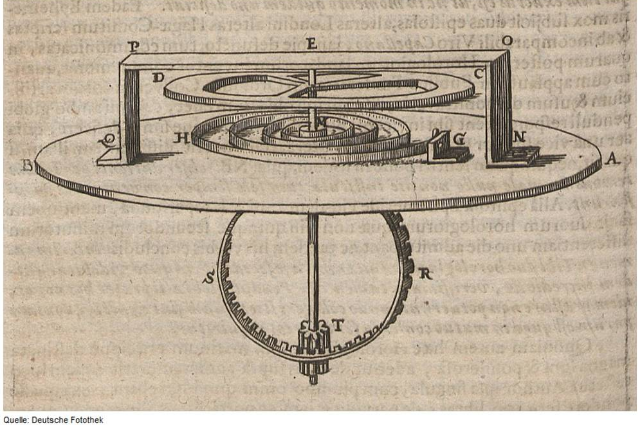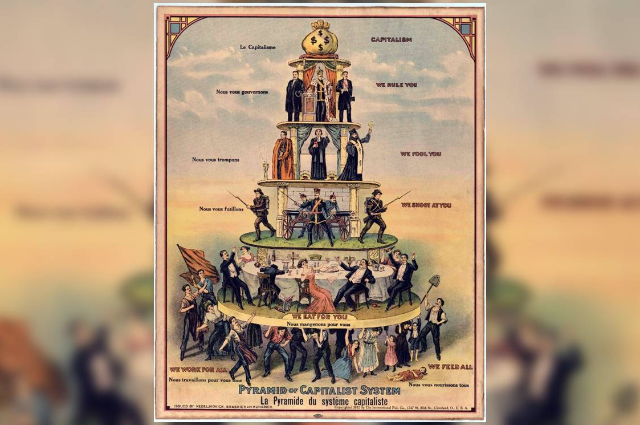
The Industrial Workers of the World poster "Pyramid of Capitalist System" (1911)
(Image from Wikipedia)
It's been weeks since I joined a Multi-National Company whose roots emerge from Europe. Like any other graduate, I was glad at this opportunity. Apart from learning and experience, I felt terrific at the thought of earning on my own. With money, I could finally become an ardent slave satisfying capitalist’s notion of “Spending for a better life” without my conscious choice. Free markets are best when you are a daily wage laborer, but if you happen to be an independent human with a sufficient income while maintaining social media account, it is tough and wrong to assume that you are truly free of your choice. We will be ruined by advertisements before understanding our stand in this chaotic world.
To make a choice one must be free, and if we have to be free we shouldn’t be thinking between the four walls of a cubicle. Let's say we happen to escape the cubicle when my stomach roars for food, it is almost certain that we will stumble into a big hall with spacious seats and a pantry with hygienic food curated by the same company you work for. It is hard to let it go when it is cheap and healthy against an uncertain roadside alternative. Even if we are stubborn over consuming it, there’s always a special canteen to cook our favorite dish. Once again we are locked and voluntarily denying our breakout.
Now that our stomach is full, our adipose tissues welcome a new layer of the gut to stand out against fancy clothes which we have amply. We need to digest it and bring it into balance as we cumulatively hear the horrific news stating that cardiovascular diseases are one of the major causes of death that are the result of obesity and lack of exercise. We may not be obese now, but we are assured that we will be if we continue at that pace of ingestion of sugar and fat. Our next step is to hit the gym, play hardcore games, and sweat as much as possible. Where to go? You need not think anymore as your corporation is happy to help. The subscription is almost free and you are happy that you are friends are joining you. When you were on the verge of breaking out of a cubicle, you are stranded to gravitate towards it in the name of health. Health is wealth, there’s no doubt but we voluntarily forget that our health is also their wealth.
You are having good food now, exercising daily, bank account's getting stuffed but still, something’s missing. As we often find a song on Instagram stories that goes, “He said one day you’ll leave this world behind, there are the nights you will remember…”, on whose background stands your friend over the top of a hill flailing his arms wide with his back turned against you, watching the sunrise with a flush of greenery spread all across the horizon. You want to travel and you suddenly start to complain about your life as you try to invoke this fancy need to post photos. No need to worry about that too. Your Corporation has arranged for an outing regardless of your request as if they knew exactly how you feel. They want you to equip yourself with your team members to go to a park or a sanctuary nearby with pastries and cold drinks, fully funded by the department- where you never really know who exists and who isn’t. Finally, your Instagram goes with, “He said one day you’ll leave this world behind, these are the nights you will remember…”
“Clearly, then, the city is not a concrete jungle, it is a human zoo”
- Desmond Morris, The Human Zoo: A Zoologist's Study of the Urban Animal
Looking at the insignificance of laws that restricts big corporations from sucking an employee’s private time it won’t offend a bit to conclude that we never wanted a work-life balance in the first place. All we need is a Balance- the one that keeps us upright at the cost of things that we might explore otherwise. Science says that [1] Caged animals[Mink] get bored with prolonged stay, but if they are treated by providing new opportunities they can get into an active state. I feel great pity as I go on to compare every corporate employee to a Mink in a cage, it's clearly evident why we aren’t bored or demotivated. We are being nourished like a caged animal with myriad factors like Money, Vouchers, and Holidays. Even if we get bored like a non-conformist Mink, the only way out is to join another cage with another treatment.
Nothing Changed with a Change.
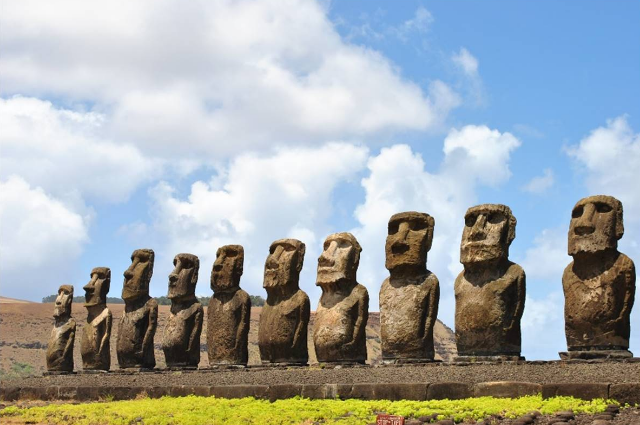
Moai, Rapa Nui (Easter Island)
(Image from Wikipedia)
We stand like Idols from Easter Island,
witnessing the change around,
but never changing ourselves
as our inherent thoughts were built up of rocks prebound.
The world as we see it today wasn’t always the way it is. Forget centuries, it wasn’t the same even a second ago. Change sweeps our minds like a cloud of dust leaving chunks of memories to wander confused about what was authentic and what I want to be real. Even to define the age of the renaissance we need to have unbound imagination than numerical facts to get into the structure of society of that period. Data may fail, but the story we build won’t cease until it gets a new motive or reason out of our living.
Hierarchy has always been the defining characteristic of primates and other mammals. We were ruled by an Alpha while we were apes. We were governed by a priest who commanded the will of God. Kings, Charlatans, Dictators, Politicians, and many more including the ideas of nation and religion have always ruled over us. At every point in the formation of modern human society, we were always told to perform a specific role. We assume we are playing a small part in the drama of humanity and give up on things that are not so beyond our control. Throughout the agricultural revolution that mended a hunter-gathering brain into a specialized one, we have seen the emergence of myriad jobs. A female born to a farmer, without exploration of mind and body hides in a kitchen, occasionally going to market and temple, reproducing and taking care of her lineage with very little or no thought of breaking free and becoming a queen of the state. It is not genetic to be conformist in the first place and yet she is what she doesn’t want to become. This mode of livelihood with a higher order to inject ideas and stories has what defined humans as species of class.
“You either cleaned up other people's messes or you didn't--and that was the class system for you, right there.”
― Mick Herron, Real Tigers
It appears that this very controlling class system is the reason for our collective survival. A hand in a body must feed the food to the mouth, the brain must think, and the legs must travel. If we compare these body parts to the human class system, it would be wrong to say that a farmer was meant to do the task of a farmer as the hand is meant to be hand. Humans aren’t parts, we are a whole. The hierarchy was introduced inside each of the whole not for the survival of a humungous society, but for their own. Evolution doesn’t necessarily select the best of the species, it selects those that thrive- even the worst of the species. What can’t be ignored here is that natural selection works on individuals than on a group. What if, in some mysterious way, we happen to grow collective conscious feelings to jump out of our boundaries and reach the point where we pursue a task we want to do for the rest of our lives? It may sound satirical or dark, but it is what has happened and is happening with all of us right now, this shift from conventional work to independent pursual was brought up by the so-called Capitalists creating a new era of freedom, enlightenment, and slavery. Although it did eradicate the class system of the previous age, it gave birth to a new one based on wealth. It was a milestone where most humans changed their self-perception from farmer, potter, and carpenter to general workers. It was the change that shaped not just the fate of our perception of an ideal society but also brought forth huge revolutions to face itself only to win over it, because, it was completely based on our force of selfishness. We all came out of history with different predefined jobs to become history being called a servant of a predefined job.
“The working class seek value in money, the middle class seek value in the object, but the rich only seeks value in power.”
- JR. Rim
Today even the most ardent adherers to capitalism are dependent on its products. We cry to ban meat while posting pictures of burgers in McDonald's. We hate and abhor pollution but love to own a vehicle and travel the world with plastic bottles. We wouldn’t want to kill birds but complain the mobile company with the internet gets slow. It's all our doing and our crumbling into stupidity while getting older and older without knowing what we really fought for.
Feudalism to Capitalism to Communism:
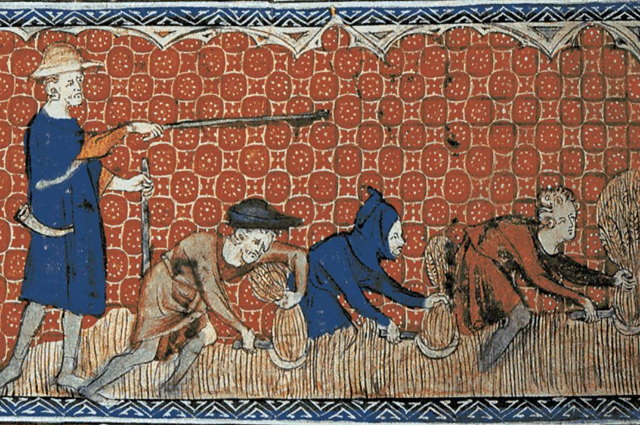
Depiction of socage on the royal demesne in feudal England, c. 1310
(Image from Wikipedia)
Landlords used to roam on their chariots while slaves plowed and harvested the fields. Small landowners gazed at their depleting produce ready to sell part of their land to the landlords. If the landlord decides to lend money at the request of failed potter or carpenter, the receiver was indebted for his lifetime, sometimes forcing his family tree to stay in debt and work under him. This was changed when capitalists arrived. They didn’t arrive just like that, they came up with the idea of elevating feudalism for the mutual benefit of their worker. From then on, nobody would take a birth indebted to a landlord. The landlord was replaced by Companies with land, machines, and other assets. Ownership took a shift from a person to an entity. Who got this idea? Why he got this idea? Nobody knows, but I am sure that it was not one man. It may be the culmination of minds over a period of time to produce this change. The working of Capitalism began in the 1400s before the term ‘Capitalism’ was introduced by Adam Smith.
“Cash is a debt instrument issued by a sovereign government, and all debt instruments are subject to the creditworthiness of their issuers, so is cash.”
― Naved Abdali
These turn of events are hard to describe by looking at the effects they made on an individual level. An average man was no longer destined to die with his traditional job, he had the opportunity to work on something he was good at or explore many new things. The problem with that early stage was there was very little or no room for a layman to build his own company. The credit system was poor and trust in the future economy was feeble. Nobody would dare to lend money to me if I had told them that I would spend a few years in R&D to bring a new medicine to tuberculosis and sell it in mass. The currency too was circulating among the rich hands and very little was expected from an average man.
The exploration of the world by Europeans changed these conditions for good and bad. [2]The Guns, Printing Press, and Compass brought in change that we never thought possible in present terms. With new land they found markets to exploit and sell. With new technology, they found means to explore the new world. This cycle of exploring, conquering, and selling, got them to the top of the world’s stage making them the first successful capitalists with a smudge of hatred on their faces. Everybody hated them when they invaded indigenous materials only to leave behind new methods of navigating ships. But today’s world is the result of Globalization with products of a toy maker in an unknown part of India reaching the Bahamas at the other end.
They were haughty as any landlords. Wanted money more than trust. The scintillating idea that capitalism promised came with a dear price. With more produce, more money circulated, and with more money, more people wanted to buy, with more customers, more product was to be produced, and to produce more, more workers were needed for longer hours. Hence, it came to a bitter end where the independent worker fell into competition with his colleague to impress his boss and earn more money. Farmers traveled to cities to work in factories. Industries expanded and ideas were incubated. People began trusting the future and the credit system was ready to take over the world taking us into debt to someone or something for all our lives.
"Debt is the slavery of the free."
- Publilius Syrus.
While these changes took place, two outliers, in 19the century were investigating the way where workers would take over their owners creating a world of harmony with no ownership. Frederick Engels and Karl Marx introduced their first warning to the capitalists with their works “The Communist Manifesto”, “Capital” and much more.
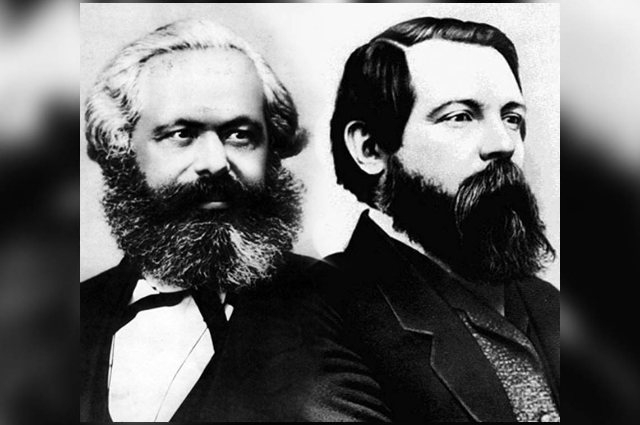
Karl Marx and Friedrich Engels
(Image from Wikipedia)
Time redefined.
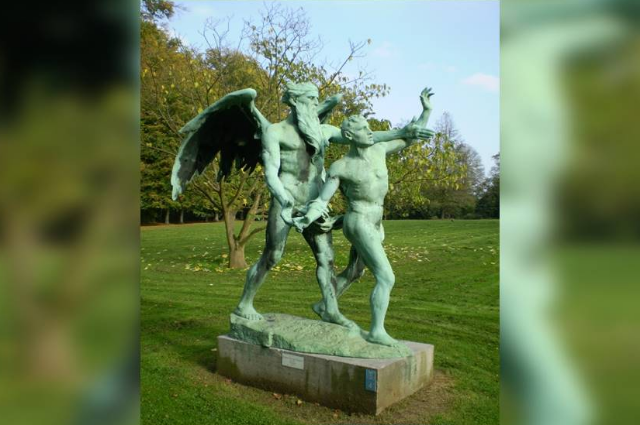
Time's mortal aspect is personified in this bronze statue by Charles van der Stappen
(Image from Wikipedia)
Defining time is like defining the meaning of the word, word. But, when language fails to consider the problem, science hops in to determine the term by this quantitative or relative value.
[3]“The faster you move through space, the slower the time runs”, Einstein redefined our basic idea of the fourth dimension with his Special Theory of Relativity. It revolutionized the world in a way that was never done before. It was a stroke of genius, a paradigm shift in the field of science. Time depends on motion rather than being absolute, whose idea can be derived from today’s world of hectic time schedules.
A capitalist would look at Einstein’s theory, mash it up with his interests and announce to his workers, “The faster the utilization of time, the faster the promotion and bigger the money.”
“The saddest aspect of life right now is that science gathers knowledge faster than society gathers wisdom.”
― Isaac Asimov
From defining wealth with health, intellect, and material accumulation, we came to rely on Time as the only thing that would make it possible to experience the rest. What’s more precious for a modern worker than a pleasure for some hours during a workday? What’s more important for a highly paid executive than some time with his family during weekends without phone calls from his office? Time is no more than an invisible entity that ages our bodies, it’s a measure of our lives and a deciding factor that happens to turn us into machines in a race for productivity. Do you ever feel hopeless about wasting your time? Don’t we all harass ourselves for doing things that don’t add value? It is very rare for a person, in today’s world, to sit by the window with his chip raised to the sky and wonder “Why are we here?”.
Today’s kids nowhere have time to watch the clouds float by as they try to imagine it as the crocodile eating a bunny with wings. They are in their own way, busy and hustling for a future that exists only in the minds of their parents. Sitting alone, doing nothing but thinking is no more useful for the modern world, which used to be the art mastered by numerous philosophers from the Greek period. Buddha, the artful director of mind control says that “we experience everything with our mind, even the anguish and pain belongs to the mind, what if we just observe and let it go instead of scratching the itch that doesn’t end to control us? “
The time I schedule for lunch, play, work, and sleep is the time that doesn’t belong to me. It belongs to someone who is hiring me to do some work. The true time that belongs to me is the one where I don’t bother about it getting over.
Witch-Watches.
Drawing of one of his first balance springs, attached to a balance wheel, by Christiaan Huygens, published in his letter in the Journal des Sçavants of 25 February 1675. The application of the spiral balance spring (spiral hairspring) for watches ushered in a new era of accuracy for portable timekeepers, similar to that which the pendulum had introduced for clocks in 1656.[16]
There were no wristwatches until the beginning of capitalism. Within a short period of time, it became a status symbol with dark teeth before it. The capitalists in Europe during the Renaissance expanded their wealth with the employment of sugar fields and slaves. Their mark of superiority was expressed by their dirty teeth-, which represented excessive sugar consumption. Humans are susceptible to status as we become vulnerable in front of a value system that directly or indirectly undermines our worth. With the spread of this wristwatch trend, in the late 1800s, it came to be known that those who wear them were of importance to the common good. They wore the image of strugglers and winners who make the change and take the world to a better place.
“Everything must be made as simple as possible. But not simpler.”
― Albert Einstein
Before the wristwatch was invented as jewelry for women by Patek Phillippe in 1868, the clock was either hung to a wall or an hourglass gave imprecise measurement. With wrist-watch it was as if we were owning the time than the material. We carried time with us, we thought we were masters of time, the ruler who can control what was in his hand. We were wrong. Wristwatches were the actual masters. It had bound us to our hands like a horse tied to a pole on a treadmill. We thought we were running but we were stuck in the same place with false imagination of overrunning the earth. It wouldn’t allow us to think otherwise.
As wristwatches became more and more, people spent their time wondering about time while forgetting the time which must have been timed to time their act in time. We were timed and, there was and is, no way out.
Opposition and No Backing Down:

Thomas More, whose Utopia portrayed a society based on common ownership of property
(Image from Wikipedia)
With Marx dead, his ideas took rebirth. The rise of the 20th century was predicted by the rise of Communism. It was what the poor expected too, but the forces of the market and economy that fell deep down due to world wars were the starting point for capitalism to take over the world. [4]It may feel absurd to know that most of the modern inventions from high-speed rockets to smartphones were incubated during the war to fight their enemies. Evidently, necessity breeds invention that was far off from the radar of thought during the time of harmony.
Lenin’s takeover of Russia and the fall of the Berlin Wall created a confused character of communism in the minds of westerners. They wanted to be free but didn’t want to create a void where a maniac would control them with their permission.
The ideals of capitalism struck with their best form when competition grew and customers were allowed to choose their wants. Free markets brought in things we never wanted, making us feel surplus and special at the same time. We wanted to be free and wanted to become Boss to ourselves. Apparently, it was our wish that would determine a product’s future. There was no end to it and innovations were just beginning to bring profound change in our ways of living.
Conclusion
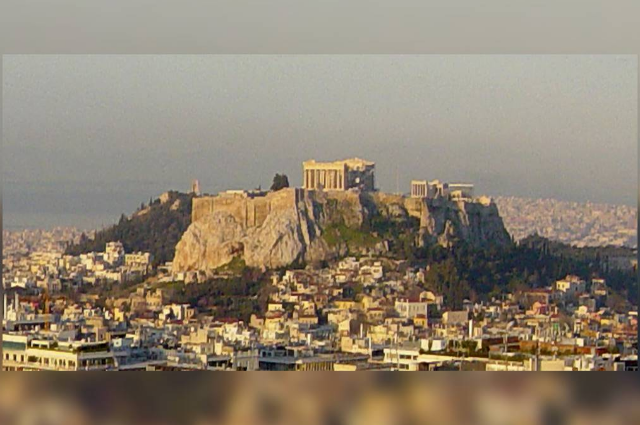
The Acropolis of Athens: Greece is widely referred to by many as the cradle of Western civilization and the birthplace of democracy.
We went from anarchy to monarchy. From Monarchy to Theocracy. Theocracy to Nationalism. Nationalism to Dictatorship. Dictatorship to Democracy. As Democracy allowed Capitalism. Capitalism reigned over Oligarchy, Communism, and all other forms of government. We can’t possibly sit on the fact that capitalism would survive the next decade or century.
The mark of all these changes is the dematerialization of the central authority. In the present situation, the internet is controlled by corporates, so there is no denying its fate as predicted by Karl Marx. Leading technologies such as blockchain and web3 are sucking off these central power and letting the whole system stand on its users. Who knows, maybe a decentralized world as the use of cryptocurrencies might be the future as written in a mind-bending novel called Snow Crash by Steven Stephenson.
It is hard to describe the happening of the future. The earth may explode tomorrow. Maybe we all would turn out to be living in a simulation. Whatever we may face, the one thing we can expect is uncertainty. And uncertainty is the driver of civilization that we need to embrace with a good heart.
Source:

